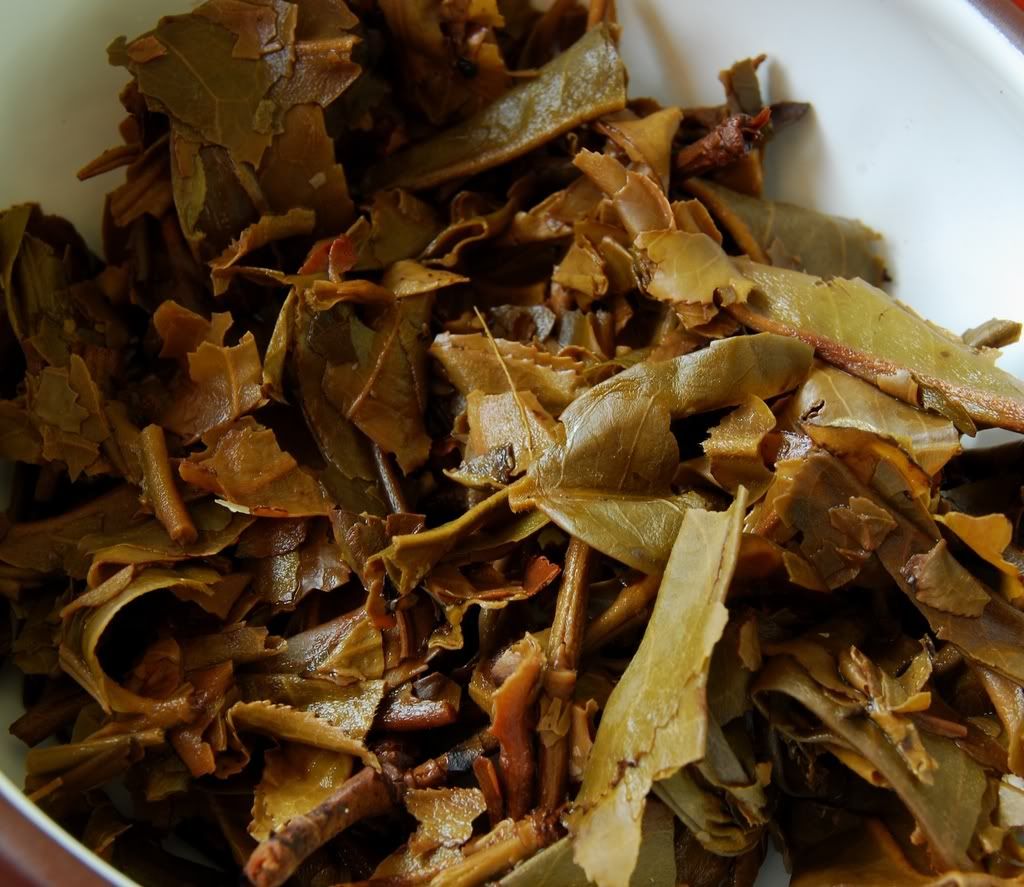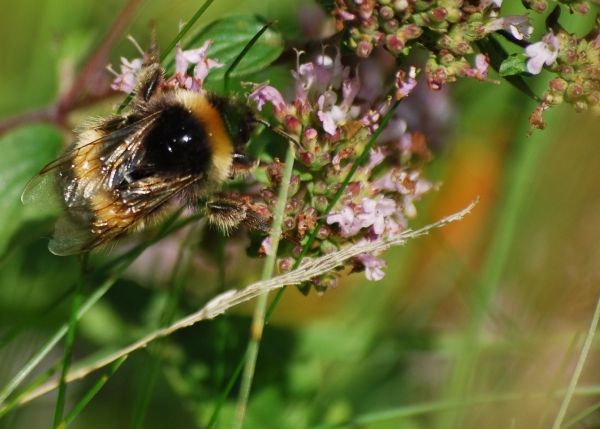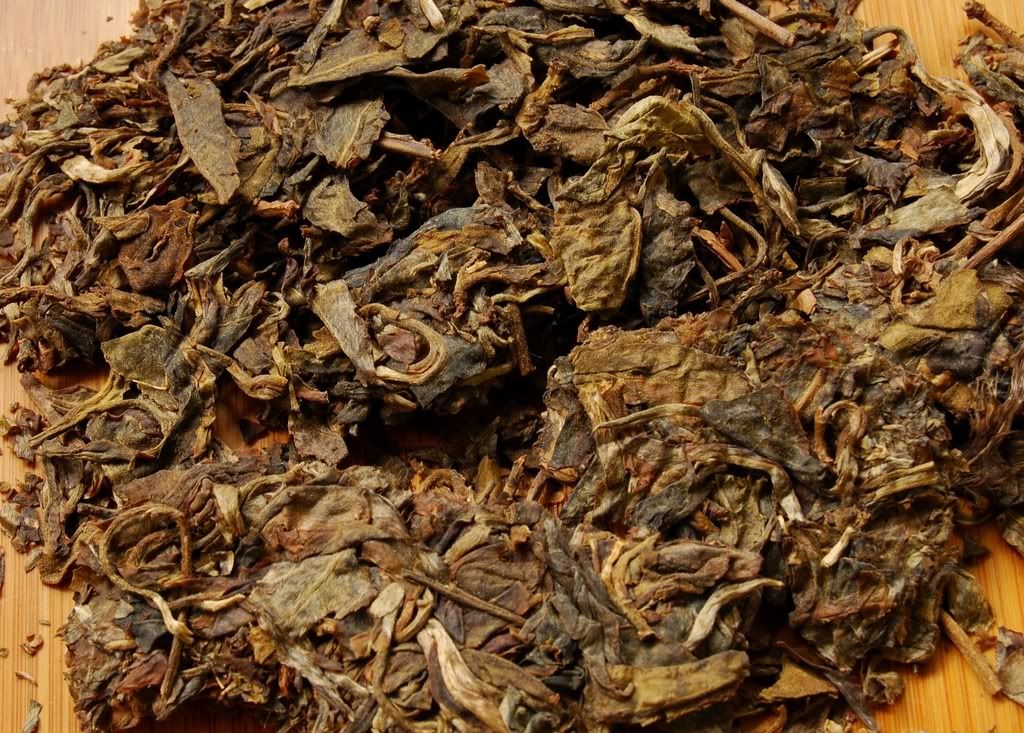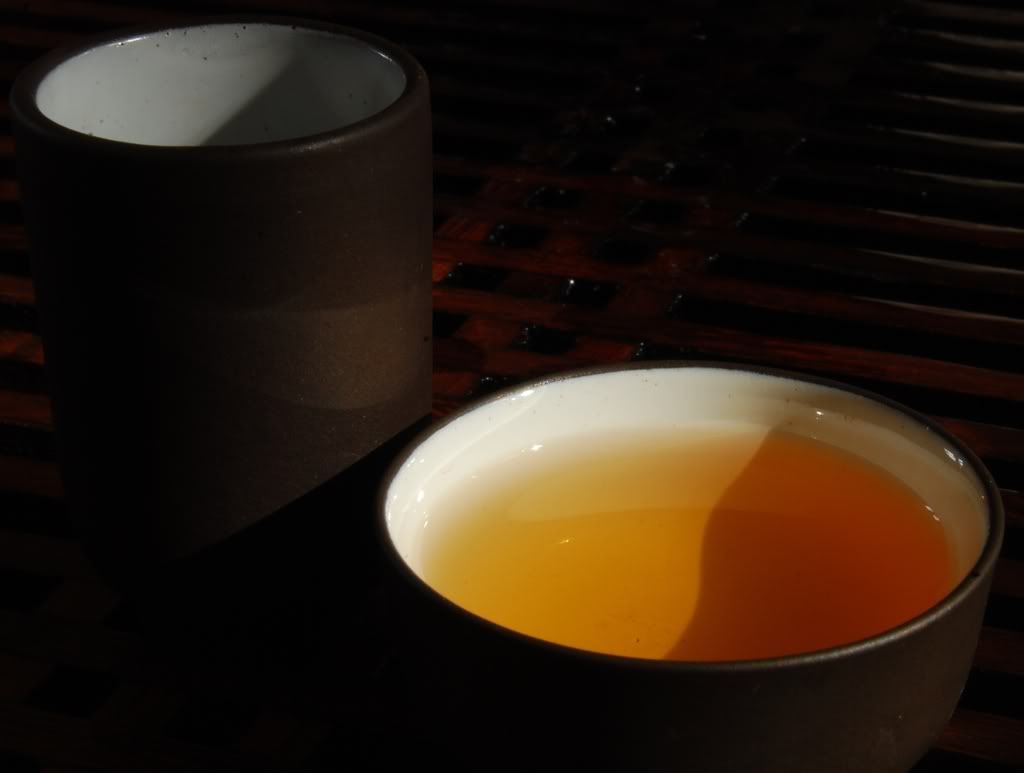Yiwu Yongpinhao are an interesting brand: I can't find them on Taobao, and Yunnan Sourcing seems to be their only outlet. Happily, a whole range of their products are available there, stretching back to 2000. I bought the 2008 "Lanxiang" [LAN-SHEEANG, orchid aroma] and the 2008 Yiwu [a.k.a. "Lingbo Qingdai"] for $29 and $24, respectively. The older Yiwu cakes are currently selling from years 2005, 2003, 2002, 2000 at $22, $68, $72, $85, respectively.
While I'm in no hurry to buy more of this brand, it's interesting to sample teas "longitudinally", as oenophiles say, to see how one (assumedly similar) recipe varies throughout the years.
Manzhuanshan is a not-too-distant neighbour of Yiwushan, in Mengla County, which also contains our old friends, Youleshan, Mangzhishan, Yibangshan, and Gedengshan. Yunnan geography always seemed a bit abstract to me, and I'm looking forward to a Xishuangbanna visit to turn the abstract network of topographies into a meaningful spatial map.
In the product description, Yunnan Sourcing states that Manzhuan leaves have a "lighter colour and more prominent fat, white shoots." This isn't something I've come across before, but it's worth bearing in mind.
The cake was wok-fried, stone-pressed, then dried without baking, as are all of the cakes from this producer.
The cake was wok-fried, stone-pressed, then dried without baking, as are all of the cakes from this producer.
The leaves, as you can see in the photograph above, are a lovely soft-brown shade. Large quantities of stems and huangpian [HWANG PEE-AN, lit. yellow flakes] are included in the blend, which gives it a definite "artisan" feel.
The aroma is a complex of low sugars and leathery sweetness. The soup is amber, with a brown hint, just like the hue of the dry leaves. In the cup, and this doesn't come out in the sun-lit picture above, it almost looks beige.
It has a slick kougan [KOH-GAN, mouth feeling], and a long, resonating huigan. Its flavour is alive with woodiness, with plenty of its original green spice remaining. It has a certain vibrancy in the mouth which rather recommends itself to me.
It has a slick kougan [KOH-GAN, mouth feeling], and a long, resonating huigan. Its flavour is alive with woodiness, with plenty of its original green spice remaining. It has a certain vibrancy in the mouth which rather recommends itself to me.

It has some touches of "redness" to it, and we can see from the above that there is a blend of all manner of leaves, from green to orange.
It's a decent tea. I can't get excited about Yiwu Yongpinhao too much, and I would definitely hesitate about paying the premium required to purchase the older cakes, but up until the 2005 mark, they seem quite good value on the Western pricing scale. That scale is interesting, because it tends to distend for older cakes and for newer cakes - this means that you can pick up the 2005 Yiwu, for example, for a lower price than either the younger or the older varieties.
My own tendency is to buy younger cakes and age them myself, but each to their own.
It's a decent tea. I can't get excited about Yiwu Yongpinhao too much, and I would definitely hesitate about paying the premium required to purchase the older cakes, but up until the 2005 mark, they seem quite good value on the Western pricing scale. That scale is interesting, because it tends to distend for older cakes and for newer cakes - this means that you can pick up the 2005 Yiwu, for example, for a lower price than either the younger or the older varieties.
My own tendency is to buy younger cakes and age them myself, but each to their own.




Dear Hobbes,
ReplyDeleteThanks for this review. I'm currently drinking the 2000 Yongpinhao "Yiwu Zheng Shan". In a similar manner to this I find the tea to also have some rather comforting 'red' notes, with plesent hints of woody, malty chocolate, honey and leather, which give way gradually to a satisfying huigan and spicier green notes in the later steeps.
I have just shy of 8g of my sample left if you fancy a little swapsie for some of yours?
Best Wishes,
Jack :)
Dear Jack,
ReplyDeleteThat's very kind! I'd love to swap samples, but at the moment my entire house is a building site and so everything is boxed up. I have a few people to whom I already owe samples, and so had perhaps better wait until the redevelopment is finished before swapping more. Thanks again for your generous offer - let's do it in a few weeks!
Toodlepip,
Hobbes
Fantastic, I'll make sure to hang on to it till then! If you drop me an email at jdmockford@gmail.com when you're all ready to go. Hope everything goes well with the refurb!
ReplyDeleteBest Wishes,
Jack :)
I've enjoyed the 2000 (from a sample), it's cleaner and more airy than many similarly aged cakes from major companies. Very dry-stored. But it requires a high dosage as it's a little timid.
ReplyDeleteOh, and oenophiles prefer to speak of 'horizontal' tasting :-)
Best wishes, Nerval
Pardon, in this case obviously a 'vertical' tasting.
ReplyDeleteDear Jack,
ReplyDeleteWill do - thanks!
Dear Nerval,
The wine societies in Oxford and Cambridge appear to use the term I quoted. I've seen "vertical" used by Americans. Like tea, there is no fixed lexicon. I can't see that it matters either way, to be honest, but mention it here by way of reply. :)
Toodlepip,
Hobbes
Great review, I need to get into these teas sometime!
ReplyDeleteGracias!
ReplyDeleteRight now I'm yearning to try different samples of Puerhs. I have a few lbs left over from purchases I've made in the past and I'd like to drink those up. But I'd also like to start buying more samples so I can experience the different Puerhs available out there. --Teaternity
ReplyDelete